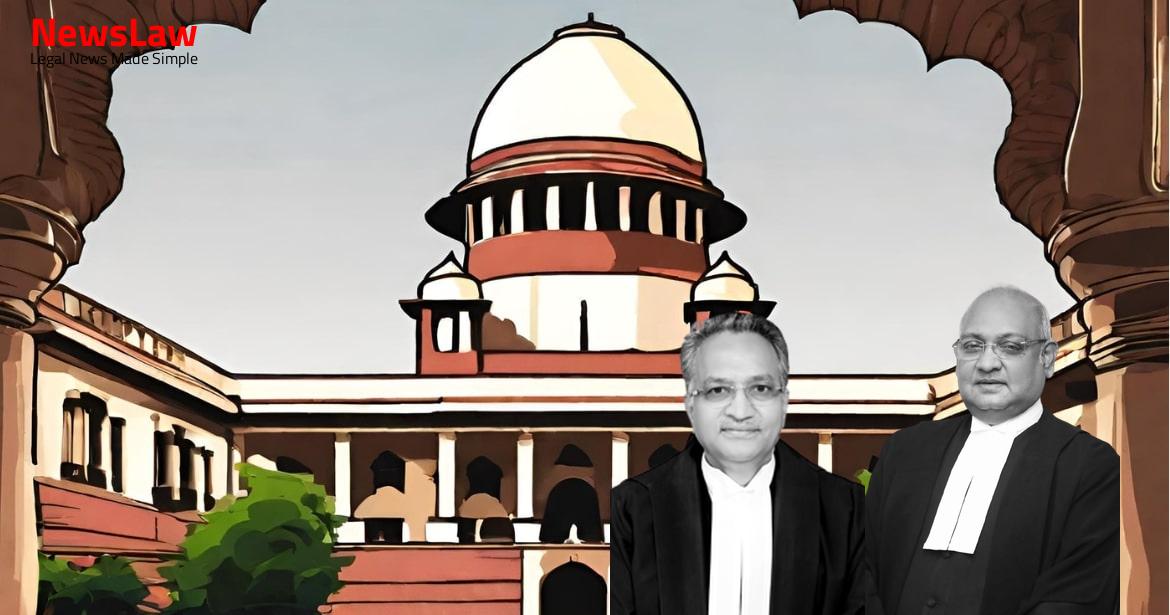The Supreme Court of India has issued a crucial judgment in the case of Agarwal v. Family Court, concerning a dispute over document production. The judgment addresses the failure of the respondent to comply with the Family Court’s directions to produce certain documents. This case sheds light on the importance of upholding court orders and commitments made before the judiciary. Read on to learn about the resolution of this contentious issue.
Facts
- The appeal challenges the judgment and order of the High Court of Delhi.
- The High Court entertained the writ petition filed by Assem Agarwal under Article 227 of the Constitution of India.
- Assem Agarwal challenged the order of the Family Court directing the production of documents.
- The High Court not only entertained the writ petition but also stayed the trial before the Family Court.
- The trial has been pending since 2011 (renumbered in 2012).
- Respondent partially complied with the direction by only producing the decree from the Family Court in New Zealand, not the judgment and divorce petition.
- Respondent filed a writ petition to challenge the order dated 01.12.2018 instead of fully complying with the undertaking to produce documents.
- Respondent, through counsel, gave an undertaking to the Family Court to file the documents on the next hearing date on 29.03.2019.
- Appellant moved the Family Court for necessary directions to the respondent, which was allowed by the Family Court on 01.12.2018.
- Directions were issued to the respondent to produce the documents, but they remained uncomplied till 19.03.2019.
- On 21.05.2019, respondent informed the Family Court that the documents were still in transit, creating an impression of delay.
- On 03.04.2019, the Family Court was informed again that the documents are still in transit.
Also Read: Supreme Court’s Landmark Judgment on Compensation for Loss of Dependency
Arguments
- The High Court was influenced by the respondent’s argument that the requested documents were irrelevant to the issue at hand.
- The respondent, who had given an undertaking to the Family Court via counsel or Power of Attorney, was obligated to adhere to it unless released by the Family Court.
- Filing a writ petition despite giving an undertaking to the Family Court is not acceptable.
- If the respondent is not excused from the undertaking by the Family Court, they must face the consequences of not producing the documents as directed by the Family Court.
- It is suggested that had the High Court been aware of this situation on 15.07.2019, they might not have entertained the writ petition.
- The respondent’s counsel claims that this argument was raised before the High Court.
- The appellant’s counsel argues that the undertaking to the Family Court was given by both the respondent’s counsel and their Power of Attorney, a claim disputed by the respondent.
- It is not necessary to delve into this disagreement.
Also Read: Land Acquisition Challenges for Integrated Infrastructure Project
Analysis
- The order in question has been allowed to become final by the respondent.
- There is no dispute regarding the finality of the said order.
- The High Court failed to consider a crucial piece of evidence in the impugned judgment.
- The omission of this evidence raises questions about the validity of the judgment.
- The High Court should have acknowledged this oversight, which undermines the judgment’s credibility.
Also Read: Legal Interpretation of Mortgage Validity in Auction Dispute
Decision
- The impugned order is set aside and the writ petition filed by the respondent before the High Court is dismissed.
- The respondent is given liberty to approach the Family Court with an appropriate application.
- The respondent can seek to absolve himself from the undertaking given on his behalf or produce the documents mentioned in the Family Court’s order.
- Any application filed by the respondent will be considered on its own merits by the Family Court in accordance with the law.
- If the respondent requires more time to produce the document in question, an application for extension can also be made before the Family Court for consideration.
Case Title: ASHI KUMAR Vs. ASEEM AGARWAL
Case Number: C.A. No.-009453-009453 / 2019



